You’ll find a ton of blog posts and resources intended to help give you content marketing ideas. Most of them present various angles marketers are using now. You know… how-to’s, lists, comparisons, newsjackers, customer stories, etc.
I’ve written plenty of content in this vein, including posts (and infographics) to help you generate video marketing ideas, infographics, and lead magnets, such as eBooks.
In this post, rather than GIVE you content marketing ideas, I’m going to tell you how (or where) to GET them.
Mostly, you “steal” them. But as I hope you know, I don’t mean you plagiarize the content other brands publish. That’ll get you nowhere. What I mean is marketing ideas are inspired by a myriad of resources—online and off.
The long list that follows explains exactly what I mean. I rely on these resources and you should too.
1. Search
Begin a search in Google or Bing. You’re not only going to find a quick little surplus of ideas, but ideas people actually search for. Because…

The search engine will attempt to guess what you’re searching for. As it detects your intention, it will suggest ideas. This is called Google Autocomplete.

Somewhere on the page, often at the top, you may see common questions (“People also ask”) and answers, a feature that appears as an increasingly common response when searches are phrased as questions.
Of course, the search results themselves may give you ideas.
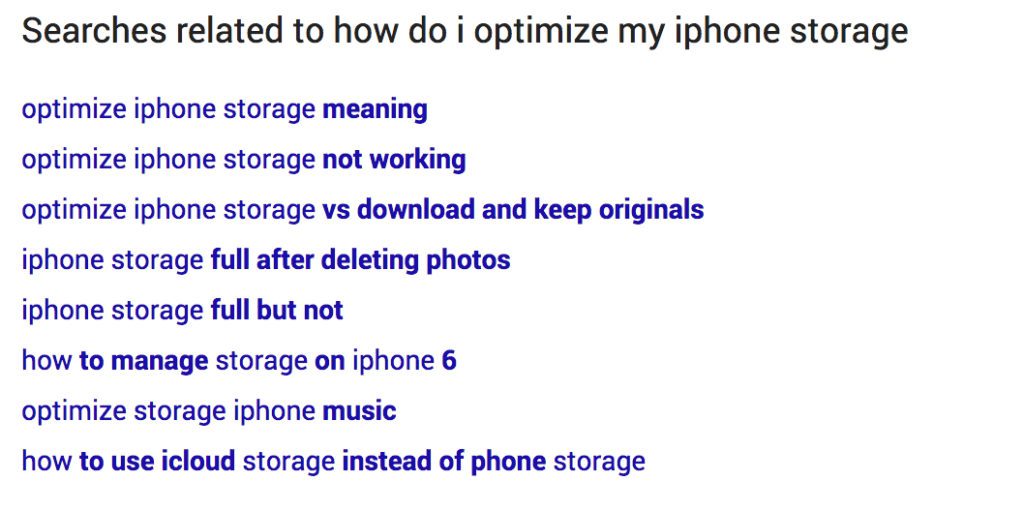
And for most searches, at the bottom of the page, you’ll see “Searches related to….” More ideas.
2. Competitors’ blogs and FAQs
If you’re not eyeing the content your competitors create, you should. You might even want to setup Google Alerts or any media monitoring tool to keep tabs on your competitors and your industry at large.

Check out their blogs and content hubs. You’re likely to find topics you can cover better, or differently. The same goes for the FAQ. Perhaps your answer to what a competitor claims is a frequently asked question merits developing an article or some form of content. Perhaps your big muscular answer makes theirs look weak.
3. Books
Say hello to Amazon, a haven of content ideas. What do people write books about in your industry?
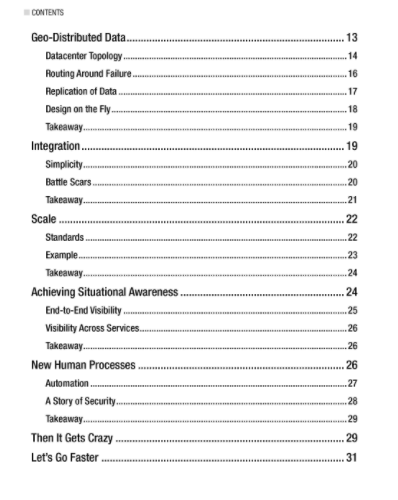
“Look inside” a relevant book (a feature most Amazon books offer). Whoa… the preview feature shows you the book’s table of contents, which may contain all kinds of content marketing ideas.
4. eBooks
Ebooks, of the freebie variety, are offered on Amazon, Scribd, SlideShare, and well, everywhere. The companies you compete with certainly market them. Searching for eBooks on a specific topic will present them to you.
Mine them for ideas. Or take one you like and do something different with it.
I’ve written numerous successful blog posts based on an eBook, or a collection of them. They often contain quotes, statistics, research, examples, and other components that make it easier to include highly credible citations and links.
5. Magazines
Remember magazines? I don’t buy as many as I once did, but I haven’t forgotten them. I subscribe to several in the digital marketing realm. Most of them are free.
I don’t read them cover-to-cover. In fact, sometimes I don’t get to them at all. But often, they become my reading material at the gym or for late night reading (is that sad?). In any case, they give me ideas.
I don’t mean to rail on any publisher in particular, but I’ll tell you most of the magazines I get about my field—digital marketing—feature fairly lightweight articles. Magazines do that.
However, the topics often have potential, so they inspire ideas for me to create posts, eBooks, infographics, slide decks, videos, etc.
6. Research
Research rocks content marketing, that is, published research reports. Join the mailing list of leaders in your industry and pay special attention when they publish research. It’s gold.
Next, use parts of it in your content. Or mine it for ideas.
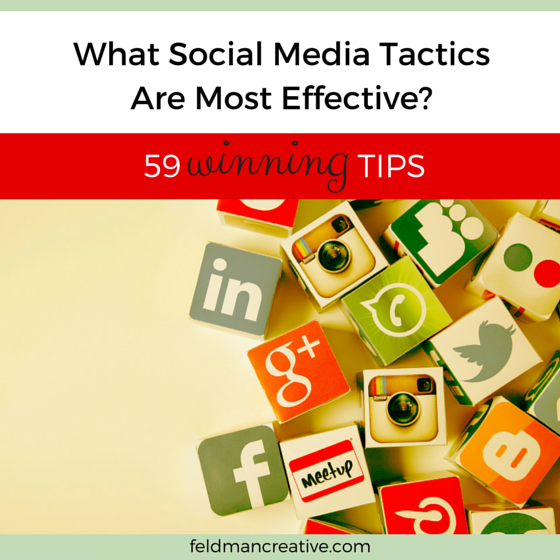
One of my most popular posts, What Social Media Tactics Are Most Effective?, literally plucks the idea from Social Media Examiner’s annual industry research report. They listed the most common questions their readers ask. I decided to answer the top one. I did so simply by researching and rounding up the best content on the topic based on reading the posts that came up on the first page of search.
7. Courses
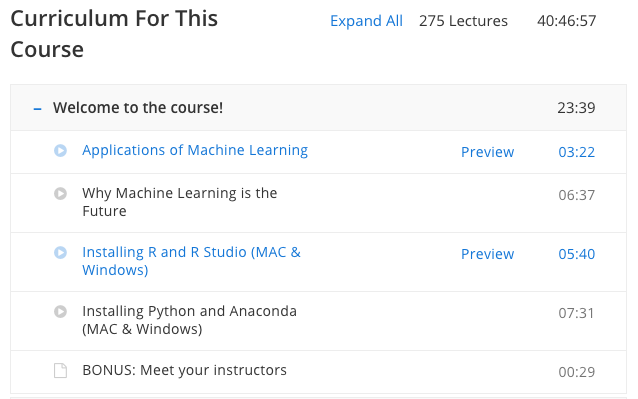
Online courses are everywhere and aggregated, for your convenience, on services such as Udemy, Skillshare and LinkedIn Learning (formerly Lynda). Much like books, they are chapterized, so a quick review of the course outline (a table of contents) is bound to be full of ideas.
8. Conferences
Here’s one of those online and off resources. Offline, or in the real world, you can attend conferences (and probably should for networking purposes). When you do, you’ll have the chance to experience several helpful keynotes, sessions and workshops.
You’ll also be given a program. Keep that thing and refer to it when seeking a content marketing idea.
Even if you can’t make it to a conference, the agendas of conferences past and future are published online.
Conference organizers will carefully vet ideas for sessions submitted by potential speakers. They tend to select the ones they believe will draw the most interest. Now there’s a cool shortcut. Someone else—probably a committee of experts—did the research for you.
Virtual summits have all kinds of models, but are essentially conferences as well, so if your industry offers them, the same strategy can be applied.
9. Podcasts
You may be producing podcasts, listening to them, or ignoring the podcasting revolution. But understand: podcasting also presents a place and resource for mining content marketing ideas.
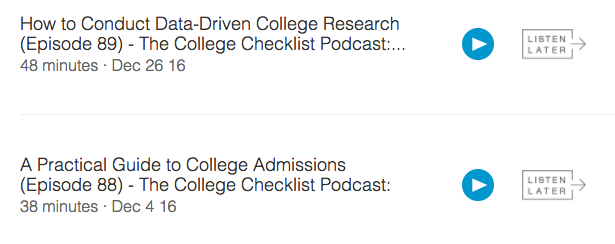
Can’t find the time? You need not listen. I must admit, though I have a podcast, I seldom listen to them. What I’m suggesting is that you simply peruse the titles of the podcasts for ideas.
10. TV
Are there television stations and networks broadcasting programs related to your industry? You can use your remote control to peruse the programs by doing a search. Or you can use the web.
There’s no doubt in my mind television programming pros are not producing shows on topics no one cares about. For me, talk shows and demonstration shows come to mind. For instance, folks like Dr. Oz and Rachel Ray are creating shows, or program segments, about topics the viewers appreciate. Thanks to the proliferation of stations, examples of highly specific programs about highly specific topics are nearly endless.
11. YouTube
Internet TV applies here too. What’s Maria Forleo up to? What are vloggers like Jenna Marbles doing? Which shows are killing it for views in your field?
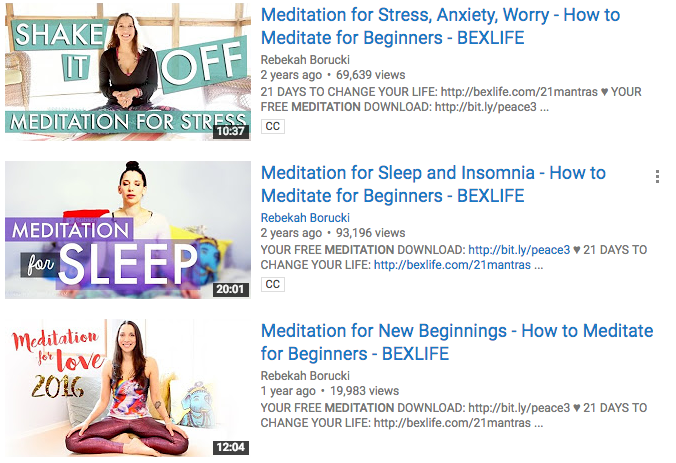
Do a search on YouTube and gather all kinds of ideas.
12. Buzzsumo
You may serve a highly specific niche and benefit from content whether or not it reached a lot of eyeballs and earned a lot of mentions.
However, learning what has indeed earned substantial social media shares and links will be helpful in your quest to discover effective content marketing ideas.
Use Buzzsumo to search by topic, URL or author. You’ll get an instant report on posts and pages that performed best.
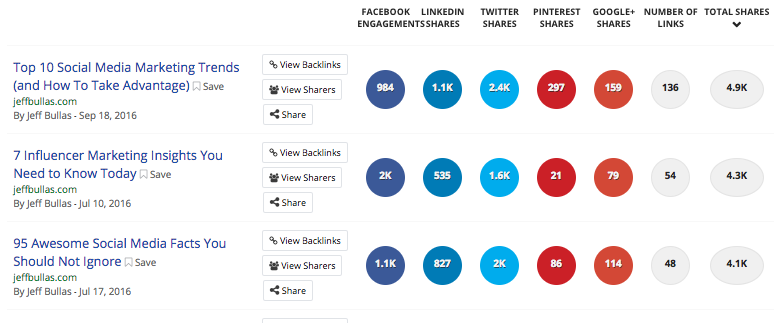
I often search Buzzsumo to see the results leaders in my field get from their content. The big winners often spark ideas worthy of content development.
13. Quora
The popular Q&A website Quora is a forum for just about everything. The questions there, and answers, will give you ideas.
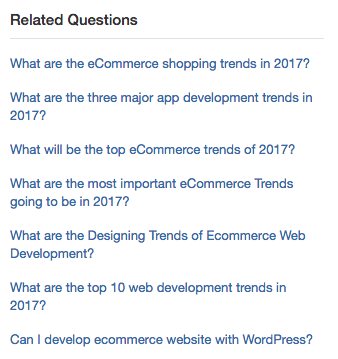
Be sure to check out the related questions.
14. Wikipedia
Wikipedia is like the world’s HQ for finding tables of contents or related ideas. Seriously, search anything. Bam! You could find:
- Detailed posts
- Links galore
- A table of contents to inspire a crazy number of ideas
- A “See also” section with even more ideas
- Notes (footnotes), references, further reading, external links
- And more
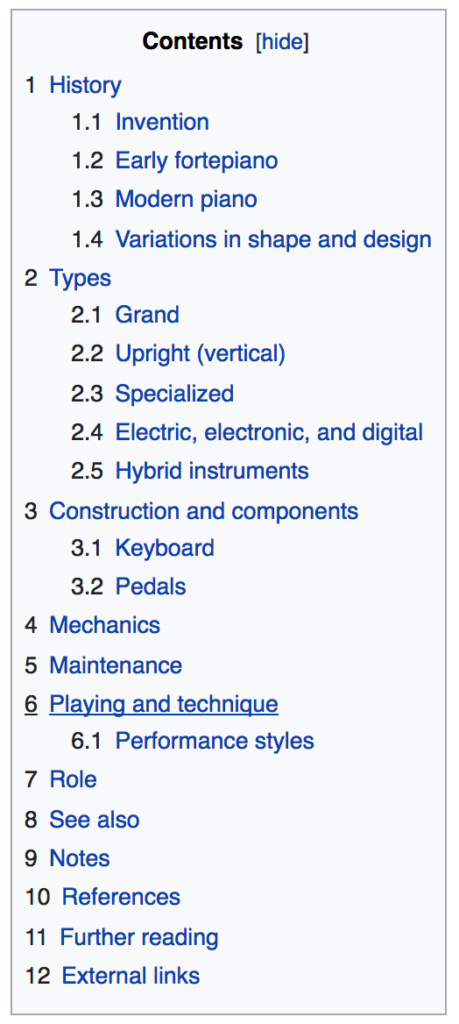
For most inquiries or topics, Wikipedia is so rich with content marketing ideas, you may not even need another source.
15. News aggregators
I got this idea (and hundreds more) from Andy Crestodina on his blog at Orbit Media. (I’m a contributor there.) Andy explains news aggregators pull blog feeds and newsletters together and can therefore be a rich source of ideas.

Andy recommends Feedly and Alltop and writes they are “…great for both research and organization.” He says, “Search for your topic and scan through the headlines with your next post in mind. Within minutes, you should spot a few themes and memes that you can repurpose on your blog.”
16. Blog comments
You have a blog, right? It’s the main reason you’re reading this long list post about where to get content ideas.
Does your blog welcome comments and questions from readers? The truth is bloggers feature comment sections less than they used to, which is probably because readers chime in less than they used to.
Still, whether it be on your blog or elsewhere, blog comments are easy to find and capture cool things such as:
- Questions and challenges readers have
- Objections readers have
- Links to related resources
- And potentially, ideas for expanding your content regarding topics readers have shown interest in
17. Email
For better or worse, I subscribe to a ton of email newsletters and updates from marketers, influencers, and relevant industry publishers. I suspect you do too.
I must admit, my morning routine generally consists of zapping 95% of them—and from time to time I go on an opt-out rampage—however, I read the subject and from lines and click-through at least a few times everyday. And that inspires ideas.
You absolutely must monitor what’s being published in your niche and, when you’re shopping for ideas, email will help feed them to you.
18. Phone calls and conversations
This may be the most under-appreciated or least mined source on the list I’m presenting. However, you’re having conversations with prospects, customers, and various types of associates daily, right?
These conversations inevitably invoke questions. Your challenge is to pay close enough attention to record them for posterity. The questions people ask you and the issues they face—especially when they care enough to take the time to ask you in conversation—are likely the most important topics you need to tackle with your content.
19. Idea generators
If you’re main game is marketing, you’re probably aware other marketers (with the required resources) create free idea generation tools. If you moonlight as a marketer, now you know.
There are quite a few worth trying…

- Answer the Public is quite handy for generating a mindmap of related ideas and questions.
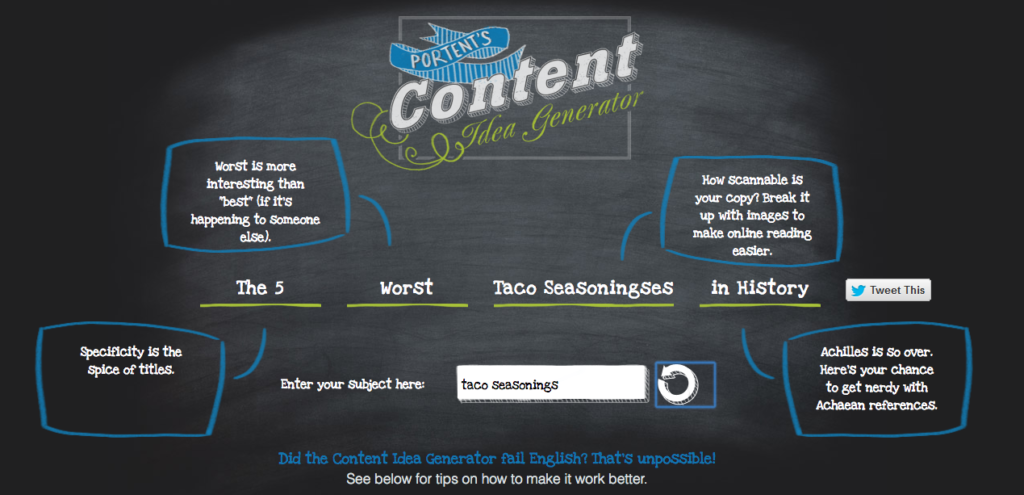
- Portent’s Content Idea Generator actually takes multiple stabs at crafting headlines for you.
- Wordstream created a post about idea generation tools that offers even more.
20. Keyword tools
Keyword tools are everywhere, free and paid. Of course, if you’re a serious SEO researcher, you’ll want to consider the paid tools and identify the feature sets and fees that work best for you. Here, for the simple purpose of hunting for content marketing ideas, I’ll present three you’re likely to find helpful and easy to use.
- Google AdWords Keyword Planner—The free tool from Google was created to help marketers plan pay-per-click ad campaigns. However, whether you buy ads or not, the tool will generate lists of related keywords based on the terms you enter and broadly estimate search volume, making it a good starting point for content marketing ideas.
- Ubersuggest
- Keyword Tool.io
Ubersuggest and KeywordTool are similar and focus on generating a long list of related search terms, largely of the long tail variety, in an alphabetical format. Search volume is not indicated with the free versions. There is, to a limited degree, a variety of ways to stratify searches (by search engines and search types). Ubersuggest includes a word cloud display option, but it’s probably more of a toy than a tool.
SlideShare, a LinkedIn company, is a massive content hub, where presentations, documents, and infographics are uploaded. The service doesn’t appear to thrive to the degree it once did, however, LinkedIn claims to have 18 million uploads in 40 content categories.
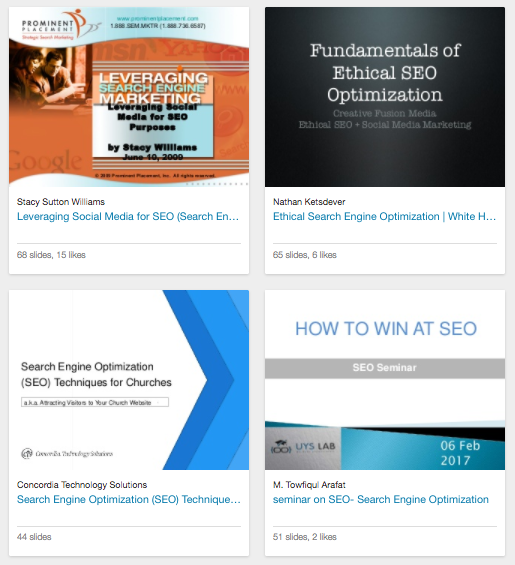 Chances are, a little searching and clicking around on SlideShare will help stir up some ideas. I’ve used it as a research tool for years and occasionally base content on what I find there, cite it as a source, or even embed the content when it’s helpful.
Chances are, a little searching and clicking around on SlideShare will help stir up some ideas. I’ve used it as a research tool for years and occasionally base content on what I find there, cite it as a source, or even embed the content when it’s helpful.
22. Pinterest
Today, Pinterest is one of the top 60-70ish websites in the world (Alexa rank of 63). Though it’s known to skew toward a female audience, believe me, there is no subject you can search for on Pinterest that won’t return an amazing amount of content.
Pinterest also sends you amazing emails based on your interests.
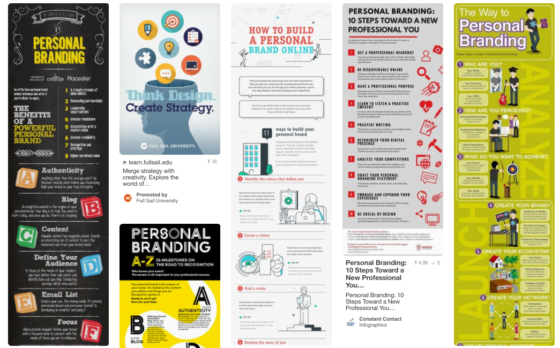
Warning: Pinterest is highly addictive.
23. Google Alerts
Google Alerts basically brings search results to you. Free. At whatever interval you choose. A free service, Google Alerts sends you emails when it finds web pages, newspaper articles, blogs, or research that match the search terms you sign up for.
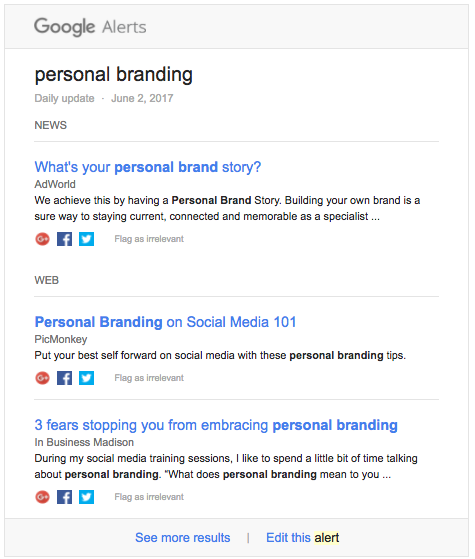
I love it. I use it to monitor my name, website, books, the areas of interest I write about in digital marketing, and the categories/topics my clients do business in. If you’re monitoring (and swiping ideas) for something specific, you definitely want Google Alerts in your arsenal.
24. Social media channels
I’ll say it again: social media is the greatest market research tool ever. The almighty hashtag… lists… groups… communities… lists… chats… discussions… analytics…
Slice it how you will, but understand the conversation about whatever it is you’re looking to have a conversation about is taking place on the popular social media channels.
And, in my mind, what makes it so great as a research tool for finding content marketing ideas, is it’s “au naturel.” What I mean by that is it’s not masked by editors. Consumers create the content. How can social media not provide important clues about what people care about?
25. Forums
I have to admit, I’m not much of a forums guy. But I’m not trying to market to me. And though it may be “old school” Internet, there are forums about everything. And you know what takes place there? People search for the answers and advice they seek.
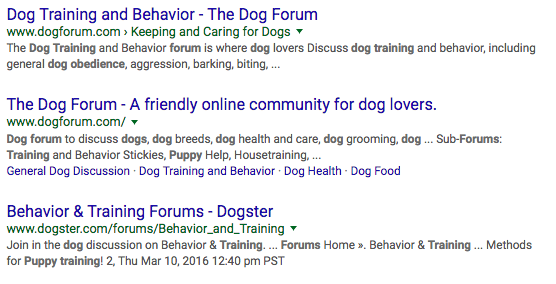
Find a forum in your niche simply by including the word “forum” in a search and you’ll see what I mean. When you find the right one (or more), you may never need another source of content marketing ideas.
26. Groups
I believe LinkedIn was the trailblazer of social media groups, but Facebook appears to the reigning king. Your call as to which groups sound more appealing or deliver more insights for your niche.
The point is, like forums, there are groups about everything. Unlike forums, on social channels, they are often moderated by an organizer who decides how “open” the group is or isn’t.
In any case, by becoming a member in a LinkedIn or Facebook group, you’ll be in the company of like-minded people who ask smart questions, deliver personal insights regarding them, and offer valuable resources. You’ll gather ideas, I promise.
Of course, you can also start your own group, as I have done (with my co-author) to support my new book, The Road to Recognition. Conversations there are often about book promotion.
27. Sales people
Perhaps it should be more obvious: the people who field questions from prospects are the most likely to know what questions need to be answered. Treat them as a resource.
- Ask your sales people to record and share the questions prospects ask.
- Ask them to mine their email and presentations to determine worthwhile topics.
- Ask them if they run into dead-ends when trying to source content for specific customer challenges.
28. Customer service people
Here again, we’re looking at the people in your company with customer-facing roles. Those manning the chats, taking support calls, conducting training, solving technical problems, or providing any type of post-sale service should be intimately familiar with topics that need tending to.
29. Staff
Sure, the sales and support people should be your first couple of stops, but if everyone in the company is pulling their weight, everyone in the company could contribute to the content ideation party.
Hit up your people for ideas. What are they seeing streaming across social media? What do they hear? A content ideation pizza party or happy hour might be fruitful and fun.
30. Help section
If your company’s site has a help or support section on its site, dig into it. Wander your way into your competitor’s help sections too. What topics could use more informed answers? What ideas could be expanded?
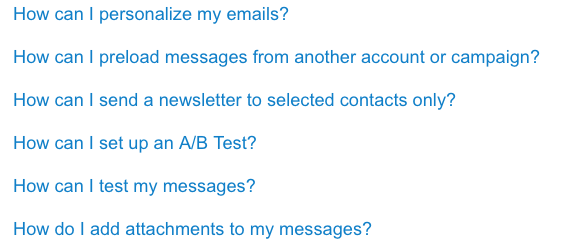
You might find help requests where the only response was a written answer or customer comments. Would a video, diagram, screenshot or downloadable asset make for a better response? Maybe the reverse is the case: a video provides help, but a blog post or guide does not.
31. Onsite search

Does your website and/or blog have a search mechanism? The data it captures is bound to tell you exactly what people are looking for, which is exactly what you need to create content about.
32. Interviews
Interviews are everywhere in every media. And pertinent questions, insights, and ideas pour forth from the mouths of both the interviewers and interviewees. You can read interviews, watch and listen to them, or conduct them and you’re bound to discover content marketing ideas.
33. Your friends and family
It’s possible this final idea of mine has never occurred to you. Conduct conversations with your friends and family about what you do. They’re very likely to respond with questions you can use.
They may bring you that “outsider” perspective you never could have, but should have discovered, otherwise.
Sometimes it just makes for a great story. I remember once, I read something that expressed the idea that the best content marketers are the essentially great teachers. I decided to do a post about the qualities of a great teacher.
So I asked my kids over dinner: Who are your best teachers? Why do you like them best? Their answers were pure, unadulterated, gold. I began taking furious notes and created a wonderful post soon after.
Useful content marketing ideas are everywhere
Want to turn searchers into visitors? Visitors into leads? Leads into customers?
Tune into some new sources, heed what you hear, and turn out some inspired stuff that’ll be helpful.







Comments
Best Rated Hand Tools 2021 | Reviews Of Time
[…] it comes to choosing hand tools, you will get what you pay. Dependable, Good, and long-lasting hand tools cost more than their inexpensive cousins, so you need a good […]